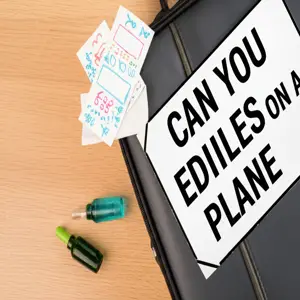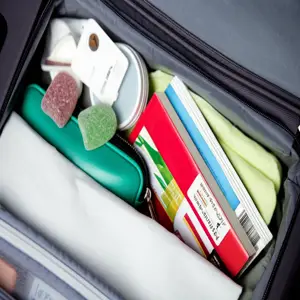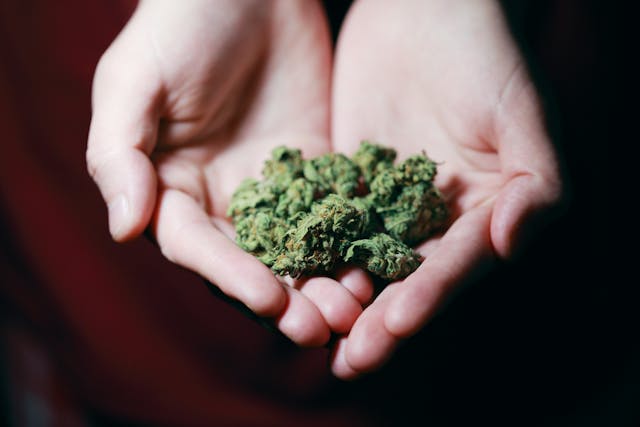Planning a trip and wondering if you can bring your favorite edibles along? Navigating the intersection of air travel and cannabis products can be tricky. This comprehensive guide provides the most up-to-date information on TSA guidelines, federal and state laws, and practical advice for traveling with edibles in 2025. Whether you’re a seasoned traveler or planning your first trip, this guide will help you understand the risks and make informed decisions about bringing edibles on a plane.
Table of Contents
Introduction: The Murky World of Edibles and Air Travel
The increasing legalization of cannabis across the United States has created a complex landscape for travelers. While some states have embraced recreational and medicinal marijuana, federal law still classifies cannabis as a Schedule I controlled substance. This conflict between state and federal regulations makes traveling with edibles a potentially risky endeavor. This guide breaks down the essential information you need to know, helping you understand the legalities, potential consequences, and best practices when considering taking edibles on a plane.

Understanding the Legal Landscape: Federal vs. State Laws
Before you even think about packing your edibles, it’s crucial to understand the legal framework surrounding cannabis. This involves differentiating between federal and state laws and recognizing how they interact.
Federal Law: The TSA and Cannabis
The Transportation Security Administration (TSA) is a federal agency, and their primary concern is security. While they aren’t explicitly searching for drugs, they are obligated to report any illegal substances they find during the screening process. This is where the conflict arises.
The TSA’s official stance on medical marijuana is available on their website. They state that their security officers are required to report any suspected violations of law, including possession of marijuana, to law enforcement officials. However, they also emphasize that their focus is on security threats, not drug enforcement.
In practice, this means that if a TSA agent discovers edibles in your luggage, they will likely notify local law enforcement. Whether you face further consequences depends on the laws of the state you are in and the discretion of the responding officers. The TSA emphasizes it’s not their primary mission to find drugs but to ensure air travel safety. However, finding contraband can complicate your travel plans significantly.
State Laws: Varying Degrees of Legality
State laws regarding cannabis vary widely. Some states have legalized recreational and medical marijuana, while others have only legalized medical marijuana, and some maintain complete prohibition. This patchwork of laws creates confusion for travelers crossing state lines.
Here’s a simplified overview:
- Legal Recreational and Medical Marijuana: States like California, Colorado, Washington, Oregon, Nevada, Michigan, Illinois, Vermont, Maine, Massachusetts, Arizona, Montana, New Jersey, New York, Virginia, Connecticut, New Mexico, Rhode Island, Maryland, Missouri, and Delaware have legalized both recreational and medical use.
- Legal Medical Marijuana Only: Many other states allow for medical marijuana use with a valid medical card. The specific conditions that qualify for medical marijuana vary by state.
- Prohibition States: A few states maintain complete prohibition of cannabis.
It’s essential to research the specific laws of your departure, arrival, and any connecting states. Just because cannabis is legal in your home state doesn’t mean it’s legal everywhere else. Possession of cannabis in a state where it’s illegal can lead to arrest and prosecution, regardless of whether you have a medical card from another state.
The Conflict: Federal Supremacy vs. State Rights
The conflict between federal and state law creates a legal gray area. Federal law supersedes state law, meaning that even if cannabis is legal in the state you’re in, you’re still technically violating federal law by possessing it. However, federal enforcement of cannabis laws has been relatively limited in states where it’s legal, focusing instead on large-scale operations and interstate trafficking.
Risk Assessment: What Could Happen if You’re Caught with Edibles?
Understanding the potential consequences of being caught with edibles on a plane is crucial for making an informed decision. The risks vary depending on several factors.
Scenario 1: TSA Discovery, Local Law Enforcement Involvement
If the TSA discovers your edibles, they will likely notify local law enforcement. The responding officers will then assess the situation based on state and local laws. Potential outcomes include:
- Confiscation: The edibles may be confiscated, and you may be allowed to continue your journey without further penalties.
- Citation: You may receive a citation or a ticket for possession of marijuana. This is more likely in states where cannabis is decriminalized or legal.
- Arrest: In states where cannabis is illegal, you could be arrested and charged with possession. The severity of the charges will depend on the amount of cannabis you possess and state laws.
Scenario 2: State Legalization, Federal Property
Even in states where cannabis is legal, airports often operate under federal jurisdiction. This means that possessing cannabis on airport property, even if it’s legal in the state, could still lead to federal charges. While federal prosecution for small amounts of cannabis is rare in legal states, it’s not impossible.
Scenario 3: Crossing State Lines: Interstate Trafficking
Taking edibles from a state where cannabis is legal to a state where it’s illegal constitutes interstate trafficking, a federal crime. While the risk of federal prosecution for small amounts of edibles is relatively low, it’s still a potential consequence. The DEA (Drug Enforcement Administration) has the authority to investigate and prosecute such cases.

Real-World Examples: Lessons Learned
Numerous news stories highlight the risks of traveling with cannabis. For instance, in 2019, a woman was arrested at Orlando International Airport for possessing CBD oil, even though CBD is legal federally as long as it contains less than 0.3% THC. While the charges were eventually dropped, the incident demonstrates the potential for confusion and legal trouble. Another example includes instances of travelers being detained in states like Texas for possessing edibles discovered during layovers, highlighting the importance of knowing the laws of all states you transit through.
TSA Guidelines: What They Say and What They Mean
The TSA’s official stance on cannabis is somewhat ambiguous, but it’s important to understand their guidelines.
Official TSA Stance on Marijuana
As mentioned earlier, the TSA states that their security officers are required to report suspected violations of law to law enforcement. However, they also emphasize that their focus is on security threats. This means that if they discover edibles during the screening process, they are likely to notify local law enforcement, but they are not actively searching for drugs.
TSA’s Focus: Security vs. Drug Enforcement
The TSA’s primary mission is to prevent terrorism and ensure the safety of air travel. Their agents are trained to identify potential threats, such as weapons and explosives. While they are required to report illegal substances, their main priority is not drug enforcement. This distinction is important because it means that if your edibles are well-concealed and don’t raise any red flags, you may be able to get them through security. However, there’s always a risk that they will be discovered.
Impact of State Legalization on TSA Procedures
The increasing legalization of cannabis has led to some changes in TSA procedures. In states where cannabis is legal, TSA agents may be less likely to report small amounts of cannabis. However, it’s still up to the discretion of the individual agent and local law enforcement. Furthermore, even in legal states, possessing cannabis on airport property may still be a violation of federal law.
Practical Tips for Traveling with Edibles (If You Choose To)
If, after considering the risks, you decide to travel with edibles, here are some practical tips to minimize your chances of getting caught:
Concealment Strategies: Minimizing Risk
- Disguise Your Edibles: Repackage your edibles in ordinary packaging that doesn’t indicate they contain cannabis. For example, put gummy edibles in a bag of regular gummy bears.
- Avoid Obvious Cannabis Packaging: Don’t travel with edibles in packaging that clearly identifies them as cannabis products. This will immediately raise suspicion.
- Store Edibles with Similar Items: Store your edibles with other snacks or candies to blend in.
- Consider Vacuum Sealing: Vacuum sealing your edibles can help reduce odors and prevent them from being detected by drug-sniffing dogs (although drug dogs are not commonly used in airport security).
Dosage Considerations: Less is More
- Travel with Small Amounts: If you choose to travel with edibles, bring only the amount you need for your trip. Possessing large quantities is more likely to attract attention and lead to more serious charges.
- Individual Packaging: Consider using individually packaged edibles to make it easier to manage your dosage and conceal them.
Documentation and Disclaimers: Covering Your Bases
- Medical Marijuana Card (If Applicable): If you have a valid medical marijuana card, keep it with you and be prepared to present it if asked. However, remember that your medical card may not be valid in all states.
- Know Your Rights: Familiarize yourself with your rights regarding search and seizure. If you are questioned by law enforcement, remain calm and polite, but don’t consent to a search without a warrant.
Alternative Options: Exploring Other Avenues
- Purchase Edibles at Your Destination: If possible, consider purchasing edibles at your destination if cannabis is legal there. This eliminates the risk of traveling with them.
- Consider Other Forms of Cannabis: If edibles are too risky, consider other forms of cannabis that may be less conspicuous, such as CBD products that comply with federal law (containing less than 0.3% THC). However, be aware that even CBD products can sometimes cause confusion and legal trouble.
CBD vs. THC Edibles: Understanding the Difference
CBD and THC are both cannabinoids found in the cannabis plant, but they have different effects and legal statuses. Understanding the difference is crucial when considering traveling with edibles.
Legal Status of CBD Products
CBD products containing less than 0.3% THC are legal under federal law, thanks to the 2018 Farm Bill. This means you can legally travel with CBD products across state lines, as long as they meet this requirement. However, some states have stricter regulations on CBD, so it’s important to research the laws of your destination.
The THC Threshold: 0.3% and Why It Matters
The 0.3% THC threshold is the defining factor between legal CBD and illegal marijuana under federal law. Products containing more than 0.3% THC are considered marijuana and are subject to the same restrictions as other cannabis products.
Potential for Confusion: CBD and Law Enforcement
Even though CBD is legal federally, there’s still potential for confusion and legal trouble. Law enforcement officers may not be able to distinguish between CBD and THC products, especially if they are not clearly labeled. Furthermore, some CBD products may contain more THC than advertised, which could lead to legal consequences.
Table: CBD vs. THC – Key Differences
| Feature | CBD (Cannabidiol) | THC (Tetrahydrocannabinol) |
|---|---|---|
| Legality (Federal) | Legal if contains less than 0.3% THC | Illegal |
| Psychoactive Effects | Non-psychoactive (doesn’t produce a “high”) | Psychoactive (produces a “high”) |
| Uses | Anxiety relief, pain management, sleep aid | Pain relief, appetite stimulation, relaxation |
| Risk of Legal Trouble | Lower risk, but potential for confusion | Higher risk, especially in states where marijuana is illegal |
Airline Regulations: Beyond TSA Guidelines
While the TSA sets the standard for airport security, individual airlines may have their own regulations regarding cannabis products. It’s important to check with your airline before traveling.
Individual Airline Policies on Cannabis
Many airlines explicitly prohibit the transportation of cannabis products, even in states where it’s legal. These policies are often based on federal law, which supersedes state law. Check the airline’s website or contact their customer service department to inquire about their specific policies.
Consequences of Violating Airline Policies
Violating airline policies regarding cannabis can lead to various consequences, including:
- Confiscation: The airline may confiscate your edibles.
- Denied Boarding: You may be denied boarding the plane.
- Banned from Future Flights: The airline may ban you from future flights.
Case Studies: Airline Enforcement Examples
While airlines rarely publicize incidents involving cannabis, there have been reports of passengers being denied boarding or having their edibles confiscated for violating airline policies. These examples highlight the importance of researching and adhering to airline regulations.
International Travel: A Strict No-Go
Traveling internationally with edibles is almost universally prohibited and carries significant risks.
International Laws and Penalties
Most countries have strict laws against cannabis, and penalties for possession can be severe, including imprisonment. Even if cannabis is legal in your home country, it’s illegal in most other countries. Don’t risk bringing edibles across international borders.
Extradition and International Law Enforcement
While extradition for minor cannabis offenses is unlikely, it’s not impossible. Furthermore, international law enforcement agencies cooperate to combat drug trafficking, and you could face serious consequences if caught with edibles in another country.
Documented Cases of International Cannabis Arrests
Numerous cases exist of travelers being arrested and imprisoned in foreign countries for possessing cannabis. These cases serve as a stark reminder of the risks involved in international cannabis travel. For example, citizens from the US have been detained and incarcerated in countries throughout Southeast Asia and the Middle East for cannabis possession.
The Future of Cannabis and Air Travel
The future of cannabis and air travel is uncertain, but several trends suggest potential changes in the coming years.
Potential Federal Legalization and Its Impact
If the federal government legalizes cannabis, it would likely lead to significant changes in TSA and airline policies. Cannabis would likely be treated similarly to alcohol, with regulations governing its transportation and use. However, federal legalization is not guaranteed, and it could be years before it happens.
Changing TSA Policies and Procedures
As more states legalize cannabis, the TSA may be forced to update its policies and procedures. They may choose to focus on other security threats and de-prioritize cannabis enforcement. However, this is just speculation, and it’s impossible to predict how the TSA will respond to changing cannabis laws.
The Role of Technology in Detection
Advancements in technology could lead to more sophisticated methods of detecting cannabis. This could make it more difficult to conceal edibles and increase the risk of getting caught. However, technology could also be used to develop methods of verifying the THC content of products, which could help distinguish between legal CBD and illegal marijuana.
Alternatives to Traveling with Edibles
If you’ve weighed the risks and decided that traveling with edibles is not worth it, here are some alternatives:
Purchasing Cannabis Legally at Your Destination
The easiest and safest option is to purchase cannabis legally at your destination, if it’s legal there. This eliminates the risk of traveling with cannabis and ensures that you are complying with local laws.
Using CBD Products Instead of THC
If you’re looking for the therapeutic benefits of cannabis without the psychoactive effects, consider using CBD products instead of THC. CBD is legal federally as long as it contains less than 0.3% THC, and it’s available in a variety of forms, including edibles, tinctures, and topicals.
Exploring Alternative Relaxation Methods
If you’re using edibles for relaxation or stress relief, explore alternative methods, such as meditation, yoga, or spending time in nature. These activities can provide similar benefits without the legal risks associated with cannabis.
FAQ: Your Questions Answered
Here are some frequently asked questions about traveling with edibles:
Can I bring edibles on a plane if I have a medical marijuana card?
Having a medical marijuana card does not guarantee that you can bring edibles on a plane. While it may offer some protection in states where medical marijuana is legal, it doesn’t override federal law or airline policies. The TSA is a federal agency, and airlines can enforce their own policies, which may prohibit cannabis products, even with a medical card.
What happens if the TSA finds my edibles?
If the TSA discovers your edibles, they will likely notify local law enforcement. The responding officers will then assess the situation based on state and local laws. Potential outcomes include confiscation, citation, or arrest, depending on the laws of the state and the amount of cannabis you possess.
Is it legal to fly with CBD edibles?
CBD edibles containing less than 0.3% THC are legal under federal law and can generally be transported across state lines. However, some states have stricter regulations on CBD, so it’s important to research the laws of your destination. Also, be aware that even legal CBD products can sometimes cause confusion with law enforcement.
Can I bring edibles on a plane in a state where marijuana is legal?
Even in states where marijuana is legal, possessing cannabis on airport property may still be a violation of federal law. The TSA is a federal agency, and airports often operate under federal jurisdiction. Furthermore, individual airlines may have their own policies prohibiting cannabis products.
What’s the best way to conceal edibles if I choose to bring them?
If you choose to travel with edibles, disguise them in ordinary packaging that doesn’t indicate they contain cannabis. For example, put gummy edibles in a bag of regular gummy bears. Avoid obvious cannabis packaging and store edibles with similar items to blend in.
What are the risks of flying with edibles internationally?
Traveling internationally with edibles is extremely risky and almost universally prohibited. Most countries have strict laws against cannabis, and penalties for possession can be severe, including imprisonment.
Do airlines have their own policies about edibles?
Yes, individual airlines may have their own policies regarding cannabis products, even in states where it’s legal. Check with your airline before traveling to inquire about their specific policies.
Can drug-sniffing dogs detect edibles?
Yes, drug-sniffing dogs can detect cannabis, including edibles. However, drug dogs are not commonly used in airport security. Vacuum sealing your edibles can help reduce odors and minimize the risk of detection.
What should I do if I’m questioned by law enforcement about edibles at the airport?
If you are questioned by law enforcement about edibles at the airport, remain calm and polite, but don’t consent to a search without a warrant. Know your rights regarding search and seizure.
Is it better to mail edibles to my destination instead of flying with them?
Mailing edibles is also illegal under federal law, as it involves using the US Postal Service to transport controlled substances. This carries similar risks to flying with edibles and is not recommended.
If federal legalization occurs, will I be able to bring edibles on a plane?
If federal legalization occurs, the laws and policies may change. Cannabis would most likely be treated similar to alcohol. However, this is pure speculation, and until the legislation is finalized, it’s impossible to predict.
I saw on Reddit that someone successfully brought edibles; does that mean I will too?
No, anecdotal stories from online forums are not reliable. What happened in other peoples’ situations doesn’t mean you will have the same experiences. There are too many variables and, ultimately, a personal decision.
Are there any airports where TSA explicitly allows cannabis products?
No. While some airports in legal states (like LAX or Denver) may have more lenient local law enforcement responses, TSA remains a federal agency and must comply with federal law. At best, they might overlook small amounts in legal states, but this is not guaranteed.
Can I bring cannabis-infused topicals (lotions, balms) on a plane?
Topicals fall under the same rules as edibles. If they contain THC, they’re federally illegal. However, CBD topicals (<0.3% THC) are legal under federal law.
What if my edibles are in unmarked packaging?
Unmarked packaging might reduce immediate suspicion, but if tested (e.g., by a drug-sniffing dog or lab), they’ll still be identified as cannabis. Lack of labeling doesn’t exempt you from legal consequences.
Do private jets have different rules?
Private flights operated under Part 91 FAA regulations (non-commercial) have more flexibility, but airports themselves are still federal jurisdictions. Commercial private jets (like NetJets) follow TSA rules.
Can I consume edibles before flying?
Consuming before a flight isn’t illegal, but airlines can deny boarding to visibly impaired passengers. Intoxication laws vary by state, and some airports (e.g., Las Vegas) prohibit cannabis consumption on-site.
Are there “safer” edible forms to travel with?
No form of THC edible is truly “safe” under federal law. However, low-odor options (like capsules or infused sugar) may attract less attention than gummies or chocolates in obvious packaging.
What if I accidentally bring edibles to a prohibition state?
If discovered, you’re subject to that state’s laws. Some states have decriminalized small amounts (e.g., a fine), while others may arrest. Never consent to a search without a warrant.
Does TSA check checked baggage for edibles?
TSA’s focus is security threats (e.g., explosives), not drugs. However, if they spot edibles during routine scans, they may report them. Checked bags are less scrutinized than carry-ons but carry the same legal risks.
Can I fly with Delta-8 or Delta-9 edibles?
- Delta-9 THC (the psychoactive compound in marijuana) is federally illegal.
- Delta-8 THC (derived from hemp) exists in a legal gray area but is banned in some states.
Both could trigger legal issues if detected.
Weighing the Risks vs. Rewards
Traveling with edibles in 2025 remains a high-risk, low-reward scenario due to the clash between federal and state laws. Key takeaways:
- Federal Law Prevails: Despite state legalization, TSA must comply with federal prohibition.
- Consequences Vary: Confiscation, fines, or arrest depend on local laws and officer discretion.
- Alternatives Exist: Buy at your destination (if legal), use CBD, or explore non-cannabis options.
- International Travel = Hard No: Many countries impose severe penalties for cannabis possession.
Final Advice
- Domestic Travel: If you choose to carry edibles, minimize risk by:
- Using odor-proof, unmarked packaging.
- Bringing only what you’ll consume (no large quantities).
- Researching state laws for departure, arrival, and layovers.
- International Travel: Never attempt it. The penalties aren’t worth it.
Conclusion: Final Thoughts on Edibles and Air Travel
Traveling with edibles on a plane in 2025 remains a complex and risky endeavor. The conflict between federal and state laws, combined with the TSA’s ambiguous guidelines and individual airline policies, creates a legal minefield for cannabis consumers. While the increasing legalization of cannabis may lead to future changes in regulations and enforcement, the current reality is that possessing edibles on a plane can result in confiscation, citations, arrest, or even denial of boarding. The decision of whether or not to travel with edibles should be made carefully, considering your personal risk tolerance, the laws of your departure and arrival states, and the potential consequences of getting caught. Remember, ignorance of the law is not an excuse, and even a small amount of cannabis can lead to legal trouble. Explore alternatives such as purchasing cannabis at your destination (if legal), using CBD products, or finding other relaxation methods. Prioritize your safety and peace of mind by making informed and responsible choices. Always err on the side of caution to ensure a smooth and stress-free travel experience. The future may hold more lenient policies, but today, understanding the current landscape is paramount for responsible cannabis use and travel.
When in doubt, leave it out. The stress of potential legal trouble far outweighs the convenience of traveling with edibles. Stay informed, prioritize safety, and enjoy your trip worry-free.
For real-time updates, check:
Safe travels—and remember, discretion is key!






